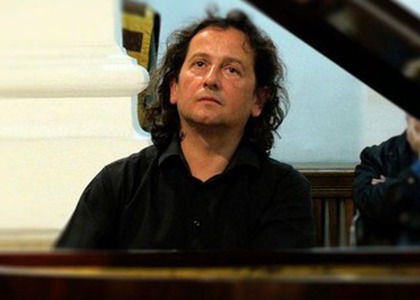> Interviews

Interview with pianist Horia Mihail
During this period, the Pianul Călător tour conducted by the pianist Horia Mihail is taking place, the last two stops will take place tonight in Caracal and, respectively, tomorrow, May 30th, 2023, at Sala Radio starting at 7:00 p.m. The performer talks about the edition with number 13 in an interview given to Ioana Țintea.
Mr. Horia Mihail, the "Traveling Piano" Tour, which has already become a brand, has reached its 13th edition, and when we hear about your traveling piano, everyone knows what it is about. Looking back, I would ask you how the journey of pianos across the country began. You said in an interview that everything started with a love for music, but also out of necessity.
It's very true. And not only the need for important communities where there was no concert piano, but also the need to save some instruments that were going to be scrapped; they were in the basements of the Romanian Broadcasting Company, pianos used for years in studios, which, here, after a very long time, are back among people who can enjoy the sounds they produce. It is about 5 instruments that belong to public radio and have been made available to some communities. They walked around the country with me, with the team that helped me, and lately they are in 5 important cities in Romania - Tulcea, Roman, Alba Iulia, Deva and Caracal.
Have you achieved all the goals set out at the beginning of this journey?
I didn't set many goals, I simply wanted this idea to come to life, and I realized later that this artistic journey made sense. Very important groups of music lovers have formed in cities where artistic activity is not very frequent. I am referring, first of all, to Deva, to Roman but also to other places in Romania. It is important that in these communities performances and concerts could be held and can continue to be held, which otherwise, without an instrument of this kind, could not have taken place. Or it could not take place.
All these years you have brought classical music to places where it has never been played. What fond memory comes to mind now about the whole experience so far?
There are a lot of them, you realize. In 13 editions, over 12 years, a lot of things happened and many of them start to mix with memories from other musical stories such as "George Enescu's Violin in the Villages" or such as "The Golden Flute" or "The Duel of the Violins" - other cultural brands born in the last decade.
What is the logistical challenge in organizing such a tour?
Given the relatively limited resources, as far as I'm concerned, the most difficult part is the route. The route through Romania, especially because our roads are quite congested and require time and a lot of attention to move from one place to another. So simply arranging the concerts in an order that makes sense geographically is quite complicated. And promotion is, again, a very important thing, considering that at this time people are bombarded with all kinds of information that is more and more interesting for them.
Every year you tackle a new theme, and this year the theme you've embraced is folkloric inspiration from the most unexpected corners of Europe. How did you think about this edition and how is the theme of folklore origins reflected in the works you will present to the public?
The idea just came a few months ago. We searched for the appropriate repertoire and designed a musical journey that starts from Transylvania, with Bela Bartok's Romanian Dances, and continues westward, with composers who either used inspiration from their own nation's folklore or were inspired by other peoples. We reach Scotland, go down to Spain and return to Romania, to be more preciseMoldova.
It is an interesting program with diverse music. From the experiences we have had so far on this tour, this program has been very well received by the spectators present.
The "Traveling Piano" tour started on May 4th, in London. You traveled a route through Alba Iulia, Deva, Brașov, Iasi, Roman, Bârlad. How would you describe this release and what has been the public response so far?
Very good! And we had tremendous attendance at the concerts; far above the average number of spectators who come to chamber recitals or a solo recital. They were happy and I was happy to see and feel their joy.
Translated by Georgiana-Carmen Rădulescu,
University of Bucharest, Faculty of Foreign Languages and Literatures, MTTLC, year II
Corrected by Silvia Petrescu














